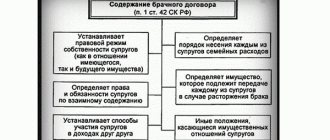Rosstat provides disappointing statistics - more than half of marriages break up. Every year the Civil Registry Office registers about 600,000 divorces. More and more couples prefer to live without legalizing their relationship.
However, without properly registering a marriage, couples are at great risk. Living together in a so-called “civil” marriage, a man and woman do not owe each other anything. This freedom is good as long as you don’t have to divide your acquired property - after all, according to the law, cohabitants cannot have anything acquired jointly.
It was a completely different matter when the couple was married. Upon separation, the husband and wife will be able to make a division of property by agreement or in court. Let's consider the features, rules and order of the procedure.
Division of property during divorce
Spouses have the right to divide property during marriage or after divorce. Depending on the situation, the division can occur on the basis of an agreement on the division of property, a marriage contract, or in court.
Consultation with a lawyer on the division of property
If the need arises to divide acquired property, it is recommended to contact a professional lawyer or attorney. A specialist will analyze the situation from a legal point of view and tell you how best to act.
Consultation with a Lawyer or Advocate includes the following points:
- will explain legal regulations;
- will conduct negotiations;
- prepare a draft agreement on the division of property;
- will collect evidence to exclude the property from the list of jointly acquired property;
- will help increase or decrease the share;
- draw up documents for filing a lawsuit;
- will represent the client's interests in court.
The actions of a lawyer or advocate will be aimed at protecting the rights and interests of the client. To get advice, contact a specialist in any convenient way.
Rules for the division of jointly acquired property of spouses
The rules for the division of property of spouses are enshrined in Art. 38 RF IC. In accordance with this normative act, division can be carried out both during the marriage and after its dissolution. Any of the spouses or a creditor may initiate the division.
If the spouses do not have a dispute, they divide the property by drawing up an agreement. If it is impossible to reach a compromise, the issue is resolved in court.
When a division occurs through a court, the authority has the authority to determine what property goes to each spouse. If one of them receives property the value of which is higher than his due share, the second is paid monetary or other equivalent compensation. In addition, the court may recognize some property as the personal property of the husband or wife.
There is a statute of limitations for court cases regarding division of property. It is three years from the date of divorce. This means that a husband or wife has the right to apply to a judicial authority with a claim for division only within three years.
Increasing the share when dividing property
The principles for determining shares when dividing property of spouses are reflected in Art. 39 RF IC. As a general rule, everything that was acquired by a husband and wife during marriage is divided equally between them in the event of a divorce.
However, in accordance with this normative act, the court may deviate from the principle of equality of shares. This requires compelling reasons.
Reasons for increasing the share of one of the spouses may be:
- presence of minor children who will live with him;
- the occurrence of an illness or long-term disability while performing the duties of a family member (for example, the husband earned money to provide for the family and received a spinal injury);
- fulfillment of obligations by one of the spouses to pay debt obligations;
- domestic work of a non-working spouse who runs the household and cares for children.
You can also reduce your spouse's share during division. To do this, you need to prove that he did not receive income due to the fact that he did not have the desire to find a job. The basis for reducing the share may also be negligence or negligence in relation to the property, resulting in a decrease in its market value or even loss. Another common reason for reduction is the irresponsible or immoral behavior of the spouse, which led to debt.
Agreement on division of property during divorce
If the husband and wife reach a compromise, they can divide the joint property by drawing up a written agreement. It is drawn up arbitrarily, but requires mandatory notarization.
As a rule, notary office specialists can independently prepare a draft agreement. Spouses also have the right to contact an independent lawyer who will draw up an agreement taking into account the interests of both spouses. The main thing is that the husband and wife do not have controversial opinions and agree on everything.
Division of property during a civil marriage
Marriage, popularly called “civil”, but simply cohabitation, does not fall under family law. This means that all rules regarding the division of property will not apply.
In this case, the number of years lived by a man and woman together does not matter. After separation, the property will belong to the person in whose name it is recorded. No partition by law can be effected.
Division of property during divorce through court
If the parties cannot agree peacefully, the division is carried out in court. To do this, you will need to collect documents for the property, draw up a statement of claim and go to court.
During the proceedings, the judicial authority will determine what property will be transferred to each of the spouses, and in what shares it should be divided - in equal shares or, more correctly, to deviate from the principle of equality to ensure the interests of one of the parties.
Even if the dispute over the division of property has reached the stage of judicial proceedings, the husband and wife have the right to resolve the issue peacefully. Spouses can enter into a separation agreement at any time. If this happens during the proceedings, the agreement is approved by the court and receives the force of a court decision.
Debt division during divorce
Debt obligations incurred during marriage are common to husband and wife. In this case, it is necessary to comply with the condition that the money borrowed was spent on meeting the needs of the family.
According to paragraph 3 of Art. 39 of the RF IC, the common debts of the husband and wife when dividing the common property of the spouses are distributed in proportion to the shares awarded to them. That is, if the husband received 70% of the total property, and the wife 30%, most of the debt will pass to the spouse's obligation.
Division of bank deposits during divorce
Money placed in a bank deposit is property. If it was jointly acquired, the contribution is subject to division in accordance with the general procedure.
When a deposit is opened before marriage, it is the personal property of the spouse in whose name it is opened. Even if in the future this money is used to purchase, for example, real estate, while married, this part is still not divided during a divorce - from the documents it is not difficult to track what kind of money it was.
Theoretically, the second spouse can file a claim for division of the contribution. However, it is unlikely that this idea will succeed. However, it is recommended that you consult with a lawyer if this occurs.
Cash compensation for a share in the division of property
Some objects that are part of jointly acquired property cannot be physically divided into two parts. For example, a car, an apartment, household appliances, furniture.
To achieve a fair separation, husband and wife can use the following methods:
- Selling your share to your husband/wife. To calculate the cost of a share, you can contact a professional appraiser or determine the optimal amount yourself.
- Selling the property and dividing the money in half.
Most often, in practice, a problem arises - one of the spouses wants to sell the property and divide the money in half, the second does not want to sell and demands compensation. The law does not provide for a norm according to which spouses are obliged to act according to one of the schemes.
Property tax during divorce
If property is divided during a divorce, you will not have to pay taxes. There are no legal grounds for the accrual, since the spouses do not receive any benefits.
If in doubt, you can protect yourself by drawing up a prenuptial agreement before the divorce. It will eliminate all possible claims of the tax inspectorate. It is recommended to consult with a lawyer for registration.
Children's interests in divorce
If there are minor children, it is possible to change the shares of the spouses in the event of division of property. As a rule, the parent with whom the child remains to live after the divorce receives the largest share. This is due to the fact that he will have to bear additional costs for maintaining and raising children.
If, in addition, the child suffers from any disease, there is a need to provide increased comfort, special nutrition, etc. The parent will have to bear additional expenses, which the court will compensate by increasing his share in the jointly acquired property.
Things intended to meet the needs of children are not subject to division between spouses. By default, they are transferred to the person with whom the children will live after the divorce. The second spouse cannot count on receiving compensation. Such things include musical instruments, clothing, shoes, furniture, sports equipment, books, etc. Deposits opened in the name of children are also not subject to division.
Personal or joint: division of property during divorce
Since the beginning of the year alone, the courts have received 3,031 lawsuits regarding the division of property between spouses. The majority of such disputes were considered by the Moscow City Court (133 cases), slightly fewer cases were processed by the authorities of the Stavropol Territory, Bashkiria and the Sverdlovsk Region (according to the system for lawyers Caselook.ru as of September 17, 2021). The appellate and cassation instances had to resolve the property issue of the ex-spouses; problems arise in practice when the courts need to deviate from the general rule of “everything in half” and divide the property acquired during the marriage in different shares.
Matkapital is not divided
Couples encounter difficulties if they partially purchased the property not from common funds, says Anna Artamonova, partner at AB EMPP EMPP Federal Rating. group Family and inheritance law group Criminal law group Arbitration proceedings (medium and small disputes - mid market) group Corporate law/Mergers and acquisitions TMT group (telecommunications, media and technology) 20th place By revenue per lawyer (less than 30 lawyers) 49th place By revenue Profile companies For example, they invested maternity capital, such a dispute arose between Irina and Andrei Makarov*. The wife filed a claim against her ex-husband to divide the apartment acquired during marriage. They bought the disputed housing on credit and paid off part of it with maternal capital. The court of first instance and the appeal decided that it was necessary to divide the entire apartment, but the Supreme Court reminded that in this case it is necessary to determine the shares minus maternity capital. The board indicated that the certificate funds are not subject to division, since they are not common property, but have a designated purpose (by virtue of paragraph 2 of Article 34 of the SK) (case No. 18-KG19-57).
The position of the courts on this issue has been formed, says Anastasia Rastorgueva, senior partner at Barshchevsky and Partners Barshchevsky and Partners Federal Rating. Criminal Law group. According to the law, children must be allocated a share; accordingly, during a divorce and division of property, the spouses no longer divide the entire apartment among themselves, but only that part of it that remains after deducting the children’s share. The “Review of judicial practice in cases related to the implementation of the right to maternal (family) capital” is devoted to this issue. Despite this, the courts of first instance do not always make the “correct” decision. They have to be corrected by higher courts. For example, in cases No. 2-2841/17 and No. 2-3/2018
In case of divorce, the unused certificate itself is not divided, clarifies Irina Oreshkina, lawyer at S&K Vertical S&K Vertical Federal Rating. group Family and inheritance law group Private wealth management group Arbitration proceedings (major disputes - high market) group Bankruptcy (including disputes) group Corporate law/Mergers and acquisitions 18th place By revenue 25-27th place By number of lawyers 6th place By revenue per lawyer (more than 30 lawyers ) . It remains with the person in whose name it was written out. Typically the mother of the child.
"Mortgage" real estate
Not only the property or material assets of spouses, but also obligations are recognized as common, says Svetlana Ivanova from FTL Advisers FTL Advisers Federal Rating. Group Family and Inheritance Law Group Compliance Group Private Wealth Management Group Corporate Law/Mergers and Acquisitions Group Tax Consulting and Disputes (Tax Consulting) . For example, a loan spent on family needs. As for the mortgage, Rastorgueva clarifies, the property, the apartment itself, is divided in the same proportion as the debt for it (this principle is contained in clause 3 of Article 39 of the Insurance Code).
If one of the spouses proves that he contributed most of the loan from personal funds, then the court may increase his share in the apartment and, accordingly, reduce the amount of debt. Using the same principle, you can get the entire apartment, as happened in case No. 2-809/2016. Alina and Oleg Kataev* took out a mortgage to buy an apartment. But it was paid both during the marriage and after its dissolution only by the spouse. She asked the court to transfer ownership of the disputed real estate to her, and provided receipts for payment of monthly payments as evidence. The fact that the mortgage debt was paid off only by the wife was also confirmed by the husband. The Leninsky District Court of Tomsk satisfied Kataeva’s claim; the parties did not appeal the decision.
According to Rastorgueva, if the former spouse can still count on most or all of the mortgaged apartment, then it will not be possible to collect (if the mortgage is paid off by only one of the partners) the paid amount from the ex-husband or wife - the courts will consider that the payment was made from common funds. At the same time, Artamonova says, there are no legal mechanisms to force the former spouse-co-borrower to pay half of the monthly mortgage payment. A good way of financial protection in this case is a prenuptial agreement. It may relate exclusively to the procedure for paying the mortgage and distributing real estate between the owners after repaying the loan or in the event of divorce. For example, the size of shares in real estate can be tied in proportion to the amount of funds paid to the bank after the termination of the marriage by each spouse, the expert concluded.
Inherited
Property that one of the spouses received as an inheritance is not subject to division (according to paragraph 1 of Article 36 of the Family Code), but there is an exception to this rule: if it has been improved at the expense of common funds. This is stated in Art. 37 SK. At the same time, Ivanova clarifies, the courts take into account not the size of the investment, but the increase in the value of this property. But this needs to be proven.
The situation is illustrated by case No. 11-6249/2013. During their life together, the couple made several renovations to the apartment, which the husband inherited. This helped increase the price of real estate, the ex-wife believed. But the court did not side with her: “There is no evidence that investments increased the value of the property, which means it cannot be recognized as joint property.” The Naro-Fominsk City Court of the Moscow Region took a similar position in case No. 2-3835/2019; it indicated that the price of a house would increase significantly if a major renovation or other significant reconstruction of the property was carried out there. In both disputes, the plaintiffs failed to prove an increase in the value of the property - this is what the courts decided.
The practice of recognizing inherited property as joint property is quite disappointing. Basically, the courts refuse due to lack of proof of material investments or a significant increase in cost.
Svetlana Ivanova, lawyer at FTL Advisers FTL Advisers Federal rating. Group Family and Inheritance Law Group Compliance Group Private Wealth Management Group Corporate Law/Mergers and Acquisitions Group Tax Consulting and Disputes (Tax Consulting)
Premarital assets
The property that belonged to each spouse before marriage is his property (according to Article 36 of the Family Code). It would seem that everything is easy, says Alina Laktionova, lawyer at the Law Firm Mitra Mitra Regional Rating. group Tax consulting and disputes group Arbitration proceedings group Bankruptcy (including disputes) group Land law/Commercial real estate/Construction 10-11th place By the number of lawyers, but in practice the application of the article causes difficulties.
A difficult situation arises if one of the spouses bought a plot of land before marriage, and then, together with his wife or husband, built a house on it. This happened in case No. 2-1408/2018) Alan Burangulov* bought a small rural house before his wedding. Afterwards, he demolished it and built a new one. After getting married, he and his wife continued the reconstruction, eventually increasing the area of the building several times. The court of first instance considered that the disputed real estate was his personal property and was not subject to division during a divorce. The appeal, on the contrary, decided to divide everything equally. The case reached the Supreme Court, which took a different position: it is necessary to estimate the value of the house before Safiullin entered into marriage and divide the shares of the parties accordingly. At the same time, the case dealt with the issue of dividing the house, and not the plot that was left to the spouse. In this case, according to Artamonova, the land will remain with the original owner, since it is a personal asset. But the buildings should be divided between spouses.
It’s another matter, Artamonova says, if the plot was received by one of the spouses free of charge, from a local government body, that is, transferred for indefinite use. It is not equivalent to a gratuitous transaction in the sense of Art. 36 SK. Therefore, the free transfer of a land plot is not a basis for classifying it as personal property, the Supreme Court came to this conclusion in case No. 2-7993/16
You can defend the right to real estate if you prove that one of the spouses bought it with personal funds. As it happened in case No. 2-456/2018. The wife sold the “premarital” apartment, and 5 days later she paid for the share participation agreement in the new property. The housing purchased with her money cannot be considered common, the civil court panel of the Supreme Court concluded.
Another similar dispute reached the Constitutional Court. The husband purchased the apartment before marriage, but it had an encumbrance - an obligation for lifelong maintenance with dependents. After the divorce, the husband tried to admit through the court that the ex-wife had lost the right to use the residential premises. But she did not agree with this and filed a counterclaim. In it, she asked to divide the disputed apartment in half. She justified this by the fact that they paid payments under the lifelong maintenance agreement with dependents together. The situation is not standard; there is no direct regulation. The lower courts rejected the ex-wife. Then she turned to the Constitutional Court. He regarded the obligations of the spouse, fulfilled at the expense of common funds, as unjust enrichment at the expense of the second spouse (No. 352-О-О).
Unfortunately, despite the decision of the Constitutional Court, the practice is negative and the second spouse, who bore the burden of fulfilling obligations jointly, often does not have the right to compensation in proportion to his share in the common property of the spouses. Which doesn't seem fair to me.
Alina Laktionova, lawyer at Law Firm Mitra Mitra Regional rating. group Tax consulting and disputes group Arbitration proceedings group Bankruptcy (including disputes) group Land law/Commercial real estate/Construction 10-11th place By number of lawyers
Experts: IC is outdated
According to Artamonova, the Family Code, adopted back in 1995, is outdated and does not sufficiently regulate the property relations of spouses in modern realities. Therefore, the expert believes, when dividing property, a lot of questions arise. Including when jointly acquired property is not divided equally. The law indicates that the court can release equality of shares (Clause 2, Article 39 of the Criminal Code), but does not determine the situations when this is possible.
In order to eliminate gaps and update the rules, changes have been introduced to the State Duma to simplify the division of property. The bill is currently under consideration and approved by the State Duma in the first reading.
The authors of the initiative were Pavel Krasheninnikov, Chairman of the State Duma Committee on State Building and Legislation, and Tamara Pletneva, Head of the Lower House of Parliament Committee on Family Issues.
The main change is that the Family Code proposes to consolidate the concepts of common property of spouses, that is, everything acquired during marriage will be considered as a whole complex (both property and debts). Now, according to the initiators, the same spouses are filing several claims for division of property. When, within the framework of one case, shares in real estate are established, and after a while in another - found assets or an alienated car.
Alexandra Stirmanova lawyer ABS&K Vertical S&K Vertical Federal rating. group Family and inheritance law group Private wealth management group Arbitration proceedings (major disputes - high market) group Bankruptcy (including disputes) group Corporate law/Mergers and acquisitions 18th place By revenue 25-27th place By number of lawyers 6th place By revenue per lawyer (more than 30 lawyers ) believes that in this case the court will need to take an active position in identifying property, which means that the time for consideration of the case may increase in this regard. Another question, the expert continues, is what if one of the spouses found out about the presence of other property acquired during the marriage, after the consideration of the case on the division of property? Obviously, changes must take into account the presence of such situations.
Another change concerns clause 2 of Art. 34 of the IC, they plan to remove the phrase “acquired from general income” from it. This will give the norm a broader meaning.
Rastorgueva is wary of this change. According to her, if the amendments are adopted, then personal property sold and purchased with this money already in marriage will be recognized as “common.” Now it is considered personal.
The State Duma is currently planning to take up the issue in October and, perhaps, the output will be a completely different document. So far, experts generally support him. “It [the bill] will have a positive effect on law enforcement practice and, obviously, will reduce the number of disputes,” Stirmanova concluded.
- Sinchenkova Anastasia
- Supreme Court of the Russian Federation
- Civil process
Property disputes during divorce
Judicial practice includes many disputes between spouses regarding the division of acquired property. You can highlight the demands of a husband or wife, which, judging by the decisions made, will obviously be losing.
Eviction of a former spouse from an apartment acquired during the marriage, since it was originally registered in the name of the claimant
Such property will be divided in half by the court, and the second spouse will retain the right to reside in the disputed apartment. Similar situations are given in Resolution of the Plenum of the Armed Forces of the Russian Federation No. 15 “On the application of legislation by courts when considering cases of divorce.” In accordance with this regulatory act, regardless of whose name the real estate was acquired or who specifically contributed the funds, if the apartment was purchased during marriage, it will be classified as jointly acquired property.
Alienation of property inherited by the second spouse or as a result of a gift, if this occurred during the marriage
According to the provisions of the RF IC, property acquired through gratuitous transactions (donation and inheritance are just such transactions) is not subject to division. If controversial situations arise, it is possible to prove the absence of grounds for division through documentation. The following are accepted as evidence: deed of gift, will, certificate of inheritance, receipts, payment orders, etc.
Recognition by court as invalid of a concluded agreement on the division of property or a marriage contract in the absence of grounds provided for by law
As a rule, ex-spouses take such a step if they understand that they are in an extremely disadvantageous position or if verbal promises made by the other party are not fulfilled. The plaintiff attempts to challenge the transaction, relying on the fact that it was made under the influence of a mistake.
Increasing the share in jointly acquired property on the basis that children remain with the plaintiff
By law, children have no rights to their parents' property. The share can be increased only if it is necessary to support the children. For example, the court may determine the transfer of a car without compensation or with a minimum amount if the car is required for transporting children.
Recognition of the exclusive right of ownership and use of an apartment acquired during marriage for one of the spouses
In this case, as a rule, the second spouse insists on recognition of sole ownership for the reason that he bore all expenses alone. Such arguments are not accepted by the court under any circumstances. In Art. 34 of the RF IC states that the right to common property also has the right to the spouse who managed the household during the marriage or did not receive income for other reasons.
How to draw up a property division agreement correctly
If the spouses have agreed on what property and how they will divide, then an agreement is drawn up with the obligatory indication of the following data:
- participants of the agreement – passport details, place of registration, contact information are indicated
- status of the spouses (married, divorced) - details of the marriage registration certificate or divorce certificate
- subject of the agreement - all common property to be divided is indicated, characteristics and cost are described
- division order – it is clearly stated to whom and what object is transferred
- in order to eliminate disputes regarding the personal property of the spouses, it is advisable to also include it in the contract
- indicate the date of entry into force of this agreement
- place and date of conclusion of the contract
- signatures of the parties with transcripts on each page
Agreement on the division of property of spouses during divorce and after
Consultation with a lawyer on the division of property
When dividing property, the help of a specialist is often required. Such cases are always associated with emotionality - after all, you have to resolve property issues with a person who was once a relative, and now acts as an opponent in the dispute. In such disputes, the assistance of a lawyer or advocate is never superfluous.
How can a lawyer help you during a divorce and after?
A lawyer or family law attorney provides the following types of services:
- assessment of possible risks;
- detailed study of the case;
- providing advice regarding the prospects of the case;
- drawing up a statement of claim;
- filing a counterclaim;
- providing information about the prospects of the case;
- collection of evidence;
- initiation and organization of examination;
- organizing an independent assessment of property;
- filing documents with the court;
- taking part in preliminary and court hearings;
- conduct of negotiations;
- ensuring compliance with the law and the interests of the principal in the process of procedural actions;
- submission of petitions and other documents;
- appealing a court decision;
- assistance at the stage of enforcement proceedings.
If the issue of division is resolved amicably, the lawyer will help draw up an agreement or analyze the existing option for compliance with legal regulations and the interests of the client. After completing the agreement, the lawyer will help you register the transfer of ownership.
Cost of a lawyer for divorce
The cost of legal services depends on the complexity of the case. The final amount that will need to be paid will be announced by the lawyer after studying all the materials as part of the consultation.
The average price for legal services is as follows:
- preparation of a statement of claim – from 5,000 rubles;
- preparation of applications – from 2,000 rubles;
- judicial protection – from 30,000 rubles;
- pre-trial dispute resolution – from 12,000 rubles;
- filing an appeal/cassation complaint – from 3,000 rubles;
- travel to a preliminary hearing or court hearing – from 8,000 rubles;
- development of a marriage contract or agreement on division of property – from 5,000 rubles.
You can find out the approximate cost of solving a turnkey case by calling the specified phone number.
| Services of lawyers and advocates | Price |
| Initial free consultation (up to 30 minutes) | FOR FREE |
| Consultation in writing | from 2000 rub |
| Drawing up an application for a court order | from 1000 rub |
| Drawing up the necessary documents: claims, complaints, requests | from 3000 rub |
| Representation in court | from 5000 rub |
| Turnkey legal protection: from claim to victory | from 15,000 rub. |
| Appeal, defense in a higher authority | from 3000 rub |
| Assistance in the execution of a court decision | from 3000 rub |
Choosing a Lawyer and Advocate for Divorce
To choose the best specialist, it is advisable to use the following tips:
- Don't skimp on a lawyer/attorney.
In matters related to property, you should not skimp on a lawyer, as there is a risk that the losses will be disproportionate. If you want to spend as little money as possible on legal protection, there is a risk of encountering amateurism or not receiving a package of services. In addition, an initially low price does not guarantee that additional charges will not arise in the future.
- Do not contact a lawyer if he guarantees a positive outcome of the case.
During the process of dividing property and dissolving a marriage, additional details or circumstances unknown to the parties may appear. Things like this sometimes change the course of things completely. For this reason, a good lawyer never gives 100% guarantees. If you are guaranteed success at the first consultation, you should stay away from the specialist. Most likely, this is a scammer or an amateur.
- Do not cooperate with a lawyer if he cannot speak convincingly.
The speech of a good lawyer should be beautiful and well-reasoned. He must be able to persuade, because the main weapon of any lawyer is eloquence.
- Choose a lawyer who has assistants.
Well-coordinated teamwork produces more results than someone working on their own. Family matters can be very complicated and often cannot be done with the help of one lawyer. It is best to contact a law firm that employs specialists in various fields.
- Choose a lawyer with a narrow specialization.
If you want a qualified lawyer to accompany your divorce process, choose a lawyer with a narrow specialization. If you have several cases in one direction that were successful, there is a greater chance that he will help you too.
Maternity capital during divorce
Issuing maternity capital is one of the methods of state support for families with children. Maternity capital is provided in the form of a personalized certificate in the name of the mother who gave birth to or adopted a second or next child.
Only the recipient can dispose of these funds. Maternity capital can be used only for the intended purpose provided for by law. Money is allowed to be spent on:
- improvement of living conditions;
- child's education;
- increasing the size of the funded pension;
- payment of a monthly allowance in the amount of the subsistence minimum for children established in the region of residence.
One way or another, maternity capital appears in the family budget. Let's figure out how to divide it in the event of divorce.
How is it divided and who gets it?
In accordance with the norms of family law, not only movable and immovable property, but also money is subject to division between spouses. An exception to this rule is targeted funds - benefits and various government subsidies.
Since maternity capital is a targeted monetary payment, it is not subject to division in the event of a divorce. This is not joint property. Matkapital goes to the person in whose name it is issued. As a rule, this is a woman, but sometimes the father of the children can count on maternal capital.
Does the husband have the right to receive it if the children remain with the father?
So, divorce and division of property cannot be the basis for transferring rights to maternal capital to the father of the children. However, in some cases the mother loses the right to receive payment.
Such situations include:
- commission of a crime by a mother against her own child;
- death of mother;
- recognition of the mother as dead or missing;
- termination of adoption of a child by the mother;
- deprivation of mother's parental rights.
In addition, a father can receive maternity capital if he independently raises two or more children (born or adopted).
With a mortgage
When purchasing housing with a mortgage using maternity capital, exactly the same rules apply as when purchasing an apartment without using credit funds. The main rule is equality of shares for all family members, including children.
The process of dividing such property has two features:
- The mortgage payment obligation between divorcing spouses is divided in half, although each of them may have a smaller share. For example, the share of each family member if there are two children will be 1/4.
- Before the loan is repaid, the sale of the mortgaged apartment may not take place. Such transactions are carried out by the bank, and the price of real estate is set below the market price. The proceeds are primarily used to pay off the debt. For an independent sale, the consent of the bank as the mortgagee will be required.
Since the apartment partly belongs to children, its sale will require the consent of the guardianship and trusteeship authorities.
If the mortgage has already been paid off, then it is necessary to allocate shares to the children within six months. Their size determines which part of the apartment can be divided during the divorce process.
How is an apartment/house divided taking into account maternal capital?
According to the Federal Law “On measures of state support for families with children,” residential real estate acquired with the participation of maternity capital funds is divided into all family members in equal shares. The law excludes the execution of any agreements - shares are divided exclusively by law.
In the event of divorce, each spouse has the right to claim only his share of the jointly acquired property. For the division, a written agreement on the division of property is concluded. If this is not possible, the issue is resolved through the court.
Property in divorce
The shares of each spouse in the division of common property are determined in accordance with the rules provided for in Art. 39 RF IC.
When dividing the common property of a husband and wife, their shares are recognized as equal, unless otherwise provided by the concluded agreement. However, the court has the right to deviate from the principle of equality of shares, based on the interests of minor children or the second spouse.
Debt obligations are also subject to division. The common debts are distributed between the husband and wife in accordance with the shares awarded to them.
What is joint property
The recognition of spouses' property as joint property is regulated by Art. 37 RF IC. In accordance with this normative act, property is recognized as joint property if it is established that during the marriage, investments were made at the expense of the common property of each of the spouses or the labor of one of them that significantly increased the value of this property (overhaul, reconstruction, re-equipment, etc.).
However, not any property can be recognized as joint property.
How and what property is divided (not divided)
Upon divorce, property that was acquired through compensated transactions during the spouses' cohabitation after registration of the union with the civil registry office is subject to division. In Art. 34 of the RF IC defines what property is subject to division in the event of a divorce. This includes:
- real estate – apartments, houses, land plots, buildings, structures;
- movable property;
- securities;
- shares and shares in the authorized capital;
- bank deposits;
- income at the place of employment;
- pensions;
- benefits and other payments, if they do not have a specific purpose.
When dividing the common property of spouses, it does not matter whether the second spouse had income and whether he invested his money.
In Art. 256 of the Civil Code of the Russian Federation establishes what property is not subject to division upon divorce. Such objects include:
- present;
- inheritance;
- real estate and movable property acquired before marriage;
- items intended for personal use (for example, clothing, shoes, hygiene products, etc.);
- the results of intellectual work (copyright, patents), while the income received as a result of such activities belongs to the common property of the spouses.
The list of personal belongings that are not subject to division does not include luxury items. For example, fur, jewelry, antiques. These things are divided as joint property in a general manner.
How to dissolve a marriage with division of property
Property can be divided both before and after divorce. Divorce can happen in one of two ways:
- Through the registry office in the absence of children and disputes regarding property or other nature.
- Through the court. A package of documents will need to be attached to the statement of claim.
When dividing property and divorce through the registry office, you will need to go through several stages:
- Filling out an application for divorce.
- Payment of state duty.
- Providing a package of documents. It includes a copy of the marriage certificate, copies of general passports, an application, a receipt for payment of state duty, and an inventory of property.
- Receiving a 30-day period to make peace and save the family.
- Preparation of a divorce certificate if the spouses do not withdraw their applications and do not agree to reconciliation.
- Drawing up an agreement on the division of property and then sending it to a notary for certification.
You should contact the registry office regarding the date of marriage or registration at the place of residence. You can also submit an application through State Services or MFC.
If the spouses could not reach a compromise or they have minor children, the divorce occurs through the court. The algorithm of actions will be as follows:
- Drawing up a list of property with options for its division.
- Payment of state duty.
- Carrying out property valuation.
- Preparation of a statement of claim according to the rules provided for in Art. 131 Code of Civil Procedure of the Russian Federation.
- Attachment of documents, such as: marriage certificate, extracts from the Unified State Register of Property, receipt of payment of state duty, etc.
- Submitting a statement of claim and documents to the court.
- Taking part in a court hearing.
- Receive a decision with the results of the review.
- Transfer of property to each other in accordance with a court order.
When the total value of the disputed property does not exceed 50,000 rubles, you should apply to the magistrate’s court. If this amount is exceeded - to the district or city.
In some cases, divorce can be carried out unilaterally. They are provided for in Art. 19 RF IC. These include:
- recognition of a spouse as missing;
- recognition of the spouse as incompetent;
- conviction or stay of the spouse in prison for a term of more than three years.
In case of disagreement with the court decision, it can be challenged in a higher authority. A month is given for this.
Division of property during divorce if there are children
Joint property can be divided between spouses if there are children only through a judicial procedure. All property acquired by them and not intended for the needs of children is distributed during the trial.
Children's property is protected by the provisions of Art. 38 RF IC. It goes to the spouse with whom the child will live after the divorce.
Claim in court for division of property
If all issues cannot be resolved peacefully, you will have to go to court. For this purpose, a statement of claim is drawn up.
It is drawn up on A4 sheet. The text of the document must be written in legally competent language and must not contain grammatical or stylistic errors. The form and content of the claim are regulated by Art. 131 Code of Civil Procedure of the Russian Federation.
The statement of claim must include the following information:
- name of the judicial authority to which the application is sent;
- identification information about the plaintiff and defendant - full name, registration address, contact information;
- information about the date of marriage and dissolution (if it has already been dissolved);
- the essence of the disagreement;
- the circumstances in connection with which the plaintiff needed to go to court;
- the plaintiff’s vision for resolving the dispute;
- list of attached documents;
- date and signature.
Documents relevant to the case are attached to the claim. It can be:
- certificate of marriage/divorce;
- general passport;
- receipt of payment of state duty;
- extracts from the Unified State Register of Real Estate and other documents confirming the existence of ownership rights to jointly acquired or disputed property.
According to general procedural rules, a claim is filed in a district or city court of general jurisdiction at the defendant’s place of residence. However, the plaintiff can also submit documents at the location of the disputed real estate or at his place of residence, if circumstances do not allow him to send documents to the defendant’s place of residence. Such a circumstance may be the presence of a young child.
When going to court, you must pay a state fee. The plaintiff pays it. In the future, this amount will be recovered from the defendant if the court satisfies this requirement.
The amount of the state duty is calculated based on the value of the disputed property. The calculation rules are provided for in Art. 333.19 Tax Code of the Russian Federation.
Property division agreement
If the husband and wife were able to agree, they consolidate the agreement by drawing up an agreement on the division of property.
Conclusion of an agreement on the division of property between spouses
A husband and wife have the right to independently decide when to enter into an agreement on the division of property. The following options are possible:
- during marriage;
- at the same time as the divorce;
- after divorce.
It is impossible to draw up an agreement on the division of property before marriage, since at that moment the couple has nothing in common and they have nothing to share. However, at this stage of the relationship, a man and a woman can draw up a marriage contract. Within the framework of this document, it is possible to determine the fate of the property that the spouses will have in the future.
What is the difference from a prenuptial agreement?
Persons who are legally married have the right to divide property by concluding a division agreement or executing a marriage contract. The choice of document depends on the goals pursued.
Let's look at the difference between an agreement and a prenuptial agreement:
| Property division agreement | Marriage contract |
| Concluded during marriage or after divorce | Concluded before marriage or during marriage |
| Entry into force is determined by the parties to the contract | Comes into force after marriage or after certification by a notary |
| Possible modes of common shared or separate ownership | The parties can establish a common joint, shared or separate form of ownership |
| Only property existing at the time of registration is registered | You can specify the rules of ownership of the property that will be acquired |
| Terminates after re-registration of rights to the listed property | Terminates after divorce |
| It is impossible to determine the participation of parties in expenses | The degree of participation of each spouse in expenses is determined |
In fact, these two documents are united only by the need for certification by a notary.
Sample agreement on division of property
There is no set form of property division agreement. However, the contents of the document must comply with the requirements of civil law. The text of the agreement includes the following information:
- date and place of registration;
- passport details of the parties;
- date of marriage;
- an indication that the parties agree to divide the property;
- listing of property objects subject to division, with a description of the characteristics by which they can be identified;
- total value of the property;
- to whom and what becomes property;
- procedure for payment of monetary compensation;
- confirmation of the absence of encumbrances;
- the moment of entry into force;
- signatures of the parties;
- Notary information and certification.
When dividing real estate, the agreement will be the basis for making changes to the Unified State Register of Real Estate. To obtain a current extract from the Unified State Register, you must contact the MFC or Rosreestr. The state fee for registering property rights is 2,000 rubles.
Certification of the agreement by a notary
An agreement on the division of property is subject to mandatory notarization by law. Otherwise it will be considered invalid.
When contacting a notary, you must provide:
- marriage certificate;
- an extract from the Unified State Register or a certificate of ownership of real estate;
- STS for a car;
- receipt of payment of state duty;
- purchase and sale agreements;
- property division agreement.
If necessary, a notary can draw up an agreement on the division of property for a fee. You can also contact a lawyer.
Division of an apartment upon divorce if it has a mortgage
If there is a mortgage, the matter is complicated by the presence of a third party - the bank, which acts as the mortgagee. The mortgaged apartment and the loan debt can be divided in a property division agreement or in court. In both cases, the bank will be directly involved.
An apartment purchased with a mortgage during marriage is considered jointly acquired property, regardless of whose name it was purchased in. The second spouse will have the right to a share, even if he did not pay the loan due to housekeeping or other family affairs. Spouses are also jointly and severally liable for loan obligations.
Agreement on the division of jointly acquired property
Property acquired by spouses during marriage (common property of spouses) can be divided between spouses by agreement, which must be notarized.
Division of jointly acquired property is one of the grounds for termination of joint property of spouses.
The common joint property of the spouses, subject to division (clauses 1 and 2 of Article 34 of the RF IC), is any movable and immovable property acquired by them during the marriage, which, by virtue of Articles 128, 129, 213 of the Civil Code of the Russian Federation, can be the object of property rights of citizens.
In this case, the division of the common property of the spouses is carried out according to the rules established by Articles 38, 39 of the RF IC, and in the part not regulated by family law - according to the rules of Article 254 of the Civil Code of the Russian Federation (Article 4 of the RF IC).
By virtue of Article 38 of the RF IC, the division of the common property of the spouses can be made both during the period of marriage and after its dissolution at the request of any of the spouses, as well as in the event of a claim by a creditor to divide the common property of the spouses in order to foreclose on the share of one of the spouses in common property of the spouses.
When concluding an agreement on the division of jointly acquired property, the spouses themselves determine the shares that belong to them, which do not necessarily have to be equal, and indicate which property is to be transferred to each of the spouses. The agreement must also take into account the rights of their minor children.
In the case of division of the common property of the spouses during the marriage, that part of the common property of the spouses that was not divided, as well as the property acquired by the spouses during the subsequent marriage, constitute their joint property.
An agreement on the division of the common property of the spouses in accordance with paragraph 1 of Article 24 of the RF IC can be submitted by the spouses for consideration by the court upon divorce in court (together with an agreement on which of them the minor children will live with, on the procedure for paying funds for the maintenance of children and (or) a disabled, needy spouse).
In the event of a dispute, the division of the common property of the spouses, as well as the determination of the spouses' shares in this property, are carried out in court. The court determines what property is to be transferred to each spouse. When one spouse is transferred property whose value exceeds his or her share, the other spouse may be awarded appropriate monetary compensation.
For certification of an agreement on the division of jointly acquired property by a notary, a notary fee is charged in accordance with subparagraph 5 of paragraph 1 of Article 333.24 of the Tax Code of the Russian Federation - 0.5 percent of the agreement amount, but not less than 300 rubles and not more than 20,000 rubles, as well as a fee for providing legal and technical services.
land plots, subsoil plots and everything that is firmly connected to the ground, that is, objects the movement of which is impossible without disproportionate damage to their purpose, including buildings, structures, unfinished construction objects, as well as parts of buildings intended to accommodate vehicles (machines) -places). Immovable property also includes aircraft, sea vessels and inland navigation vessels subject to state registration.










